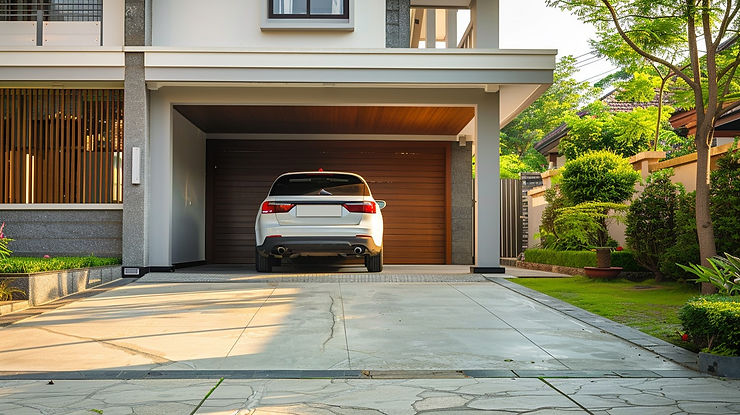The City of Vancouver doesn't know if you need to provide parking stalls for your multiplex.
You will be able to determine whether or not you need to set aside valuable ground-level floor space for parking after reading my explanation below.
People look at one set of requirements if they're smart, but most don't consider the other requirements until design begins. The result is wasted time for the project and wasted money on design fees.

The difference between having parking stalls and not having any parking stalls is significant since it increases the cost of construction and has a major impact on the efficiency or useability of a building. I've found in a past study for a particular scenario that a Zero Emissions Building (e.g. Passive House or Net Zero) doesn't make economic sense if you're providing parking.
Zoning Requirements
First, the requirement for on-site parking will vary from one municipality to another. At the time of writing, only Vancouver and Victoria have rules for multiplexes. Victoria always requires at least one accessible parking space but offers trade-offs to waive the requirement for resident or visitor parking.

The City of Vancouver does not know if you need parking stalls, but it does not require you to include any in the design of a multiplex. Unlike in Duplex, Multiple Conversion Dwelling, Multiple Dwelling, and Infill Dwelling, clause 4.2.1.4. of the Parking Bylaw 6059 states that Multiple Dwellings (e.g. multiplexes) in the R1 districts (e.g. R1-1) have no requirements for parking spaces.
That's the simple, quick answer but really should just be the start of your investigation. If you decide solely on the Planning department's regulations not to include on-site parking, changing your plans later to include parking will cost you time and money. If you're designing a multiplex in Vancouver or a houseplex in Victoria, you may want to consult with an architect who understands the regulations and can help you explore your specific needs.
Your Requirements
What are you doing with the building(s)? You may be building a multiplex for a multigenerational family. If your extended family is living on the property, do they have vehicles?

Perhaps you're building it strictly as a rental property. Rental tenants may be more accommodating and rent a unit that does not have a parking space. What kind of tenants would live there? A family may be more likely to need a car and therefore have a greater desire for parking. Students may be less likely to be driving than urban professionals. You should investigate what kind of people would be calling this area their home.
Alternatively, you plan to stratify the property and sell the strata units. Condo owners likely will insist on the freedom of having a dedicated parking space. Will you sell the property now or later? Maybe you rent for some number of years and then sell later perhaps when rapid transit to the location is much better.

What is the neighbourhood like? If the property is very near a busy commercial area, street parking may be exceptionally difficult to find. If you're near a development of residential towers where there is no longer a requirement for underground parking - the street parking situation would also be horrendous. Then again, the availability and frequency of public transit is improving and may negate the need for a resident or tenant's own car.
Other Future Needs
A parking space is also useful for loading. If you don't provide an on-site space, where will moving trucks park? This is a greater concern for rental properties. Will there be some space on the street for an Uber or a taxi? If the residents are senior citizens, where do you expect the HandyDART bus to stop and load a senior in a wheelchair or walker?

Spatial Limitations
The option of a single building on site is available. This opens up a great deal of room at the rear of the property for parking spaces.
However, most people with whom I've spoken prefer to have two buildings - one at the front with multiple dwellings and another at the rear with a primary dwelling. If you do provide a space more for loading, consider the height of the stall as well as the width and length; a parking space located under the second floor will have limited height.
Additionally, what kind of vehicles are the residents going to be driving? Just as with delivery trucks or moving trucks, some SUVs are very tall. Pickup trucks? Some of them are very long, but they'll still park sticking out into the lane if the parking space isn't long enough. Can you afford to apportion the needed room?
If you do provide parking spaces, you also must provide EV charging for each one. That being said, the residents may just as likely be driving gas vehicles. In that case, consider the exhaust fumes and engine noise while the vehicles are running. The acoustic separation between the building and the parking area is a greater design consideration.
Two Wheels

At the other end of the spectrum, a motorcycle parking space is much easier to accommodate. A motorcycle may not be a serious consideration outside of the Lower Mainland.
Victoria also has various requirements for bicycle parking - both secured and non-secured parking. Some bicycles are oversized either for cargo or are recumbent. The storage requirements are accordingly larger.

If you provide parking spaces, what will the ground be? A concrete slab is the simplest. Vancouver doesn't require permeable ground materials but will require separate stormwater detention underground. Do you expect residents to be doing their own vehicle servicing?
Over a range of project types over 25 years in Alberta and British Columbia, I've seen way too many projects get into the drawing stage before all the important questions have been asked and the key decisions made. The result is expensive redesign and lost time. The solution is frustratingly simple - we run through a standard process that hits all the checkboxes.
Wouldn't you feel good knowing that you can stand 100% behind all your decisions - especially if you're new to construction? Wandering through the design stage not knowing if you've sorted out everything could rightfully fill you with trepidation. To bring certainty, I created the R.A.D. Study* - Research, Analysis, and Diagnosis.
The RAD Study is the first phase of my process. To discuss how this process will give you confidence in your project, book a free 30-minute consultation with me - the Diagnostic Session. During this call, I'll explain how to start your project on the right foot.
Click the button below, and we'll chat.

DISCLAIMER:
The information included in this article is to an extent generic and intended for educational and informational purposes only; it does not constitute legal or professional advice. Thorough efforts are made to ensure the accuracy of the article, but having read this article, you understand and agree that Daniel Clarke Architect disclaims any legal liability for actions that may arise from reliance on the information provided in this article. I am an architect in BC, but readers are recommended to consult with their own architect on their specific situations before making any decisions or exercising judgement base on information in the article.
